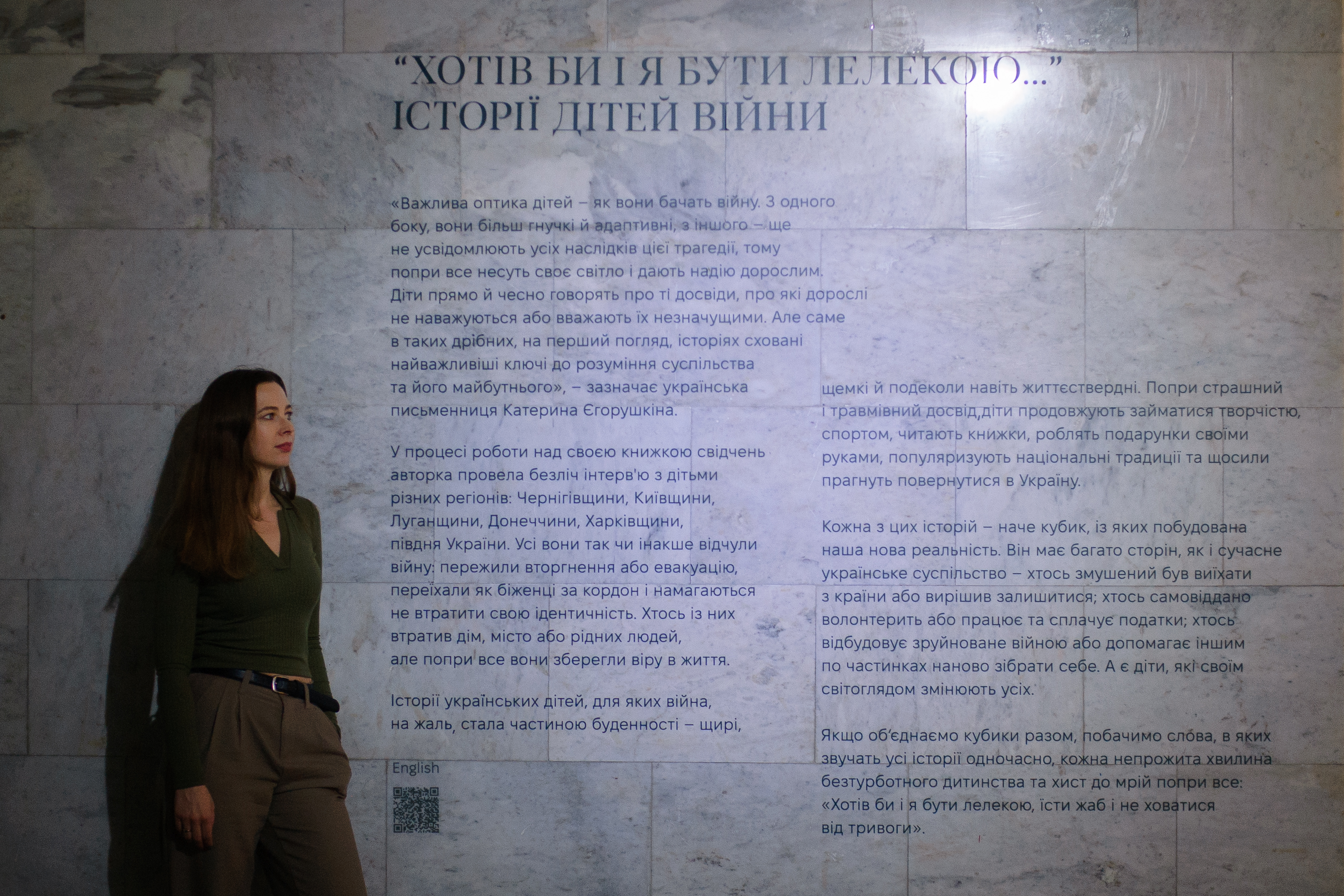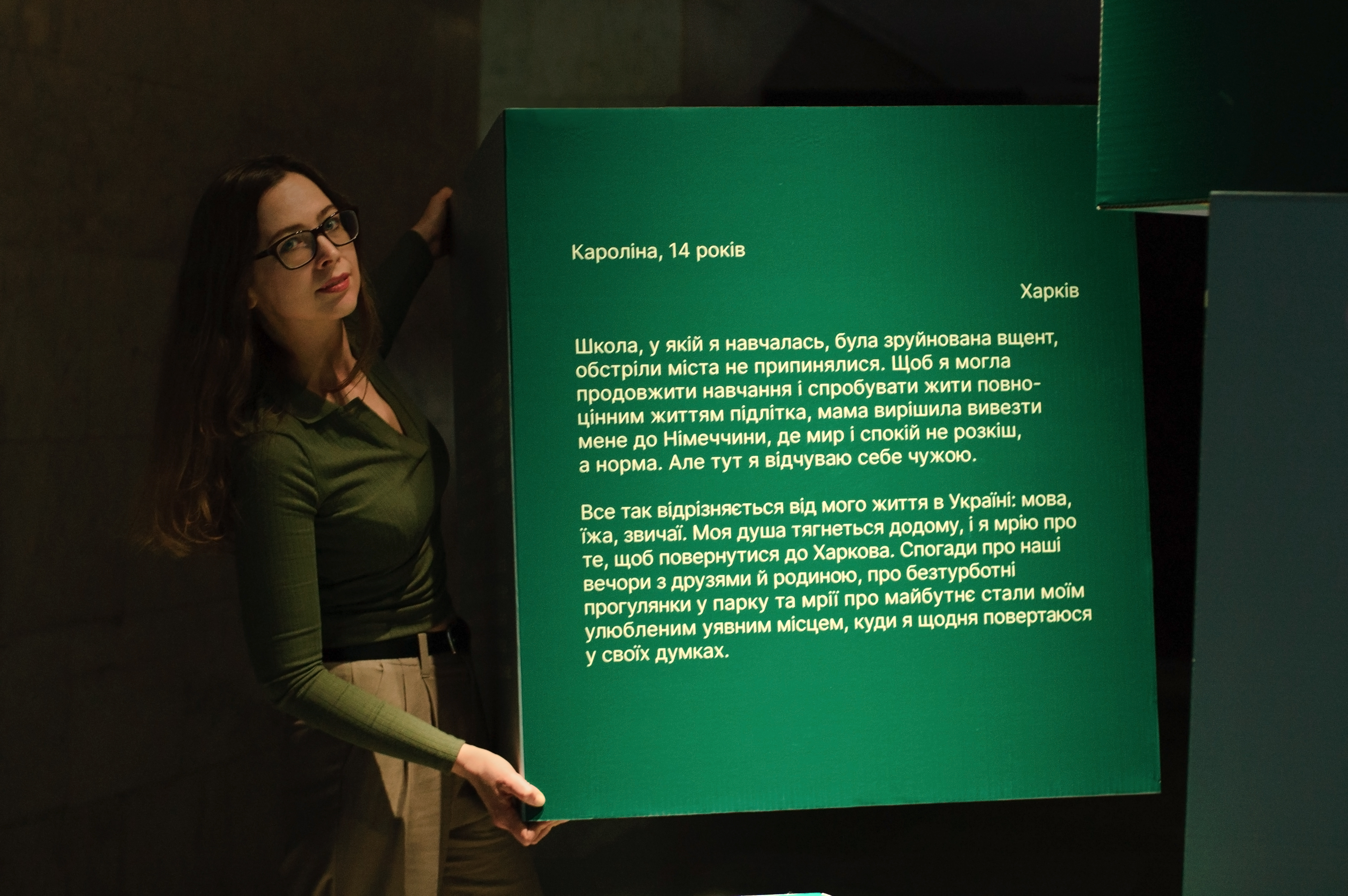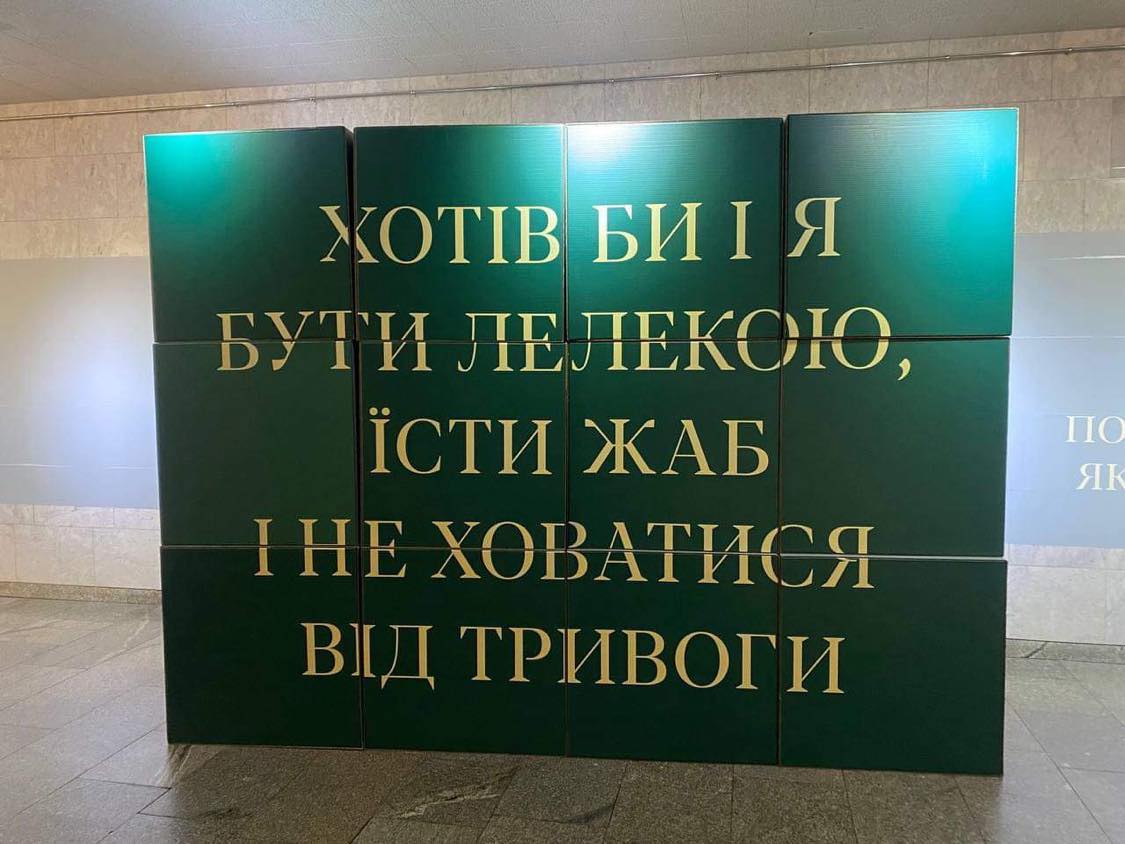In every peaceful country, the topic of war seems too adult for children to grapple with. But for those whose country has been attacked, unfortunately, there is no choice. Our children are now children of war who will deal with the consequences of this tragedy for many decades. How do Ukrainian children see the war? How do they experience it?
While working on my book of testimonies, I gathered many accounts from children. Some stories came to me by chance—in bookstores, libraries, volunteer centers, on playgrounds... Other stories I recorded through interviews with parental consent. These children come from different regions of Ukraine—some stayed, while others found refuge in Central or Western Europe. All of them, in one way or another, have felt the impact of war; they have survived invasion and evacuation, lost their homes, loved ones, or hometowns, and are now trying to mend their worlds. Children speak directly and honestly about experiences that adults do not always dare to share or may consider insignificant. Yet it is in these children’s stories that the most important keys to understanding society and its future are hidden.

The Beginning
“The war in my city began in 2014 when I was in kindergarten. I remember having a strange dream the night before that we were running, and everything around us was exploding. I told my parents, ‘Tomorrow there will be war.’ They didn’t believe me, and the next day we went to the park and heard explosions. We thought it was fireworks, but it wasn’t. We ran home to the sounds of war, and that distance felt endless.”
(Nastya, 14, Mariupol)
At that time, Ukrainian defenders swiftly liberated Mariupol from unmarked military forces. However, in 2022 the situation unfolded again, but with far worse consequences. Nastya lost her home on the shores of the Sea of Azov where her family had moved just before the invasion. She also lost her great-grandmother, who could not get the medicine she needed due to the city’s blockade. Although she thought she had lost her uncle, he was recently found; he is a civilian in Russian captivity. Her two closest friends are in other countries, and she misses them dearly. In just a few more years, Nastya will become an adult, with most of her childhood overshadowed by war. Currently, she is in Lithuania, a country preparing intensively for its defense.
Home
“I’m a saxophonist, I do kickboxing, and I go to English classes. At 8:00 on Thursday, I was supposed to have kickboxing. I set my alarm for 6:40, woke up, and texted my classmate, ‘What’s the English assignment?’ ‘What English? War!’ ‘Don’t joke—just give me the assignment.’ A few days later, my building was gone.”
(Ivan, 14, Chernihiv)
Losing a home—a place filled with warm memories—is always painful. Ivan and his mother left under shelling, crossing minefields because their city was partially surrounded. Along with his home, Ivan lost the chance to work with his favorite teachers and continue developing his talents. Now, the boy has neither saxophone lessons nor kickboxing training, and he tries to fill the void left by his former life. He still talks about his favorite activities in the present tense and dreams of returning to his native Chernihiv.
Guilt
“We don’t buy a lot of school supplies at once anymore. We did that on 23 February, and the war started. Then we dared to stock up on 9 October, and on the 10th rockets were flying again. Maybe if we hadn’t done that, nothing would have happened.”
(Matvii, 9, Khotiv village, Kyiv region)
The boy shared this story right in the middle of my book presentation in a bookstore. Other children supported his line of thought, recalling what they had done “wrong” on 23 February 2022. Accepting that someone is trying to kill you just because you live on your land and that it could happen to anyone is too painful and threatens a complete loss of control. When you are surrounded by so many wonderful people who love each other, could anyone really want to destroy your world? So, it must be because of the school supplies: You need to buy them little by little, and then there will be no war.
Games
“When it all started, we came up with a new game: If you hear thunder, run to the basement. The little one likes it. But the older one doesn’t understand why we didn’t hide from thunder before.”
(Young woman, Kharkiv)
We met on a playground in a city further from the front lines. She was pushing her daughter on the swing, and I was watching my children. In the early weeks of the invasion my eight-year-old daughter Darynka played “deportation” with her ballerina mouse. She said the Russians had taken the mouse to where the Crimean Tatars were once sent, like in Jamala’s song. She looked up Siberia on the map and pointed her finger there. My three-year-old son constantly packed his toys in a little suitcase, asking when we would return home, and then unpacked them again. Recently, he invented a new game: You build a little house with pillows and blankets, invite animal friends over, and then a rocket comes, and everyone hides under the bed. “Bang-bang! War!” he explains to his toy friends.
Friends
“When we were leaving the occupied area, my friends stayed behind to guard our home. Lapa the Knitted Bear, Sviter the Little Reindeer… My godparents gave them to me after Mom died. They’re not just toys! They’re my friends! We celebrate their birthdays, eat marker cakes, and every night I put them to bed. I missed them so much… and one day, we were reunited! They traveled across four countries to get to me. Now, whenever I go somewhere, I always bring my friends with me.”
(Andrii, 7, Kherson)
When a child loses their familiar world, certain things take on special meaning. After losing his mom, Andrii found comfort in his toys with whom he shared his thoughts and feelings as though they were real-life friends. He did not just play with them—he communicated with them. After Russian forces occupied Kherson, Andrii’s father and grandmother had to leave quickly, and his toy friends were left behind. Recently, I received a video from Andrii’s father, showing how Andrii made a cake from markers and celebrated the birthday of another friend, his blue-and-yellow Star, who also made it to Germany.
Dreams
“One summer night, we were sitting in a bomb shelter during an air raid. Missiles were literally flying over the building. We were feeling down; it was too cramped for anyone to sleep. Then we found a YouTube stream of the stork Hrytsko from the Poltava region. At that moment, I wished I was a stork, eating frogs and not hiding from alarms… Thousands of Ukrainians were watching these storks at one in the morning and thinking about reincarnation.”
(Platon, 15, Novi Petrivtsi village, Kyiv region)
There are no sirens around Hrytsko’s nest only because none were installed there—a fragile illusion of the normal life we all miss. Dreams are a way to bridge the future, to tell ourselves that a future will come, even if our planning horizon is only a few hours or days. I remember a girl in one of my storytelling therapy sessions at a volunteer center. She dreamed of a wolf. She said that when they returned to Zaporizhzhia, her parents had promised her a puppy, but a puppy could not protect her from the war, so a wolf would be better. She even thought of a name for it—Zaza.
Identity
“I’ve had a best friend, Vika, since I was little. We both left, but we want to go back. Every day we call each other and repeat Ukrainian words so we don’t forget. Last time we went over the months. I say March. She says April. I say May. She says June. And so on until February.”
(Nastya, 14, Mariupol)
One of the most painful questions I heard during a meeting with readers in Germany was: “Could you translate this word into Russian? I’m starting to forget Ukrainian.” Many children from Eastern and Southern Ukraine grew up in families whose ancestors had been Russified over centuries of harsh policies. The Ukrainian language was banned, books were destroyed, and our cultural elite faced systematic execution. Ukrainian-speaking villagers who resisted forced collectivization were subjected to Stalin's genocidal famine of 1932–33. Around 4 million Ukrainians died in that genocide. Those who survived, like my grandmother Tanya, were afraid to express their national identity and switched to Russian. Only after Ukraine regained independence in 1991 did the gradual process of returning to the ancestral language begin. Now, for many refugee children preserving their still fragile linguistic identity is a difficult task.
Loneliness
“The school I attended was completely destroyed, and the shelling of the city never stopped. To allow me to continue my studies and try to live a normal teenage life, my mother decided to take me to Germany where peace and calm are not a luxury but a norm. But here I feel like an outsider. Everything is so different from my life in Ukraine: the language, food, customs. My soul longs for home, and I dream of returning to Kharkiv. Memories of evenings with friends and family, carefree walks in the park, and dreams about the future have become my favorite imaginary place where I go every day.”
(Karolina, 14, Kharkiv)

Many Ukrainian refugee children I have spoken with in Germany, Poland, Lithuania, and Slovakia feel lonely. Sometimes the pain of loneliness is so overwhelming that children have thoughts of suicide, and psychotherapy does not always provide lasting relief. Sometimes families decide to return to Ukraine, saying they feel happier there, despite the constant threat to their lives. The children regain a sense of home, closeness, and belonging, as well as the bond with those they love. The need for emotional security grows stronger than the need for physical safety. At the same time, there is an acute awareness that this is a life lived on the edge of death.
Death
“They say there’s a game called ‘Russian roulette.’ On our highway the Russians played it, letting one convoy of civilian cars pass while shooting at another. My godfather wasn’t lucky. We buried him two months later after his body was exhumed.”
(Vasylyna, 9, Kyiv region)
I met Vasylyna at the library in early June 2022. She came with a friend to pick up new books. After the de-occupation of the village of Buzova, near the so-called “road of death,” they found a car with her godfather’s body. When Vasylyna spoke, there was a faint smile on her lips, and her voice was lively—like she was describing a movie and none of this was happening to her. Perhaps the wound is too fresh, and the realization of loss will come later.
When I volunteered at a camp for children who lost loved ones in the war, I heard many painful stories and was in awe of the psychologists who have helped these children find anchors to keep moving forward. A teenage girl at one of my sessions wrote an essay about her dreams and then gave me a handmade toy she had sewn herself. “My dad loved to write poetry, and I love to sew and draw… This is a teddy bear for you. I sewed it for seven hours. When you feel sad, let it give you a hug.”
Silence
There will not be a story here about how eight-year-old Marharyta has been experiencing the war in her home village in the Kharkiv region because the war has outlived her. A Russian shell killed her as she was reading a book on a bench outside her house.
Nor will there be stories of the 585 Ukrainian children lost to Russian attacks so far—children killed in their own beds, in cars, in kindergartens, on playgrounds, in shopping centers, cafés, and even in maternity wards. These children will never grow up, never have children of their own, never carry on the thread of life. A part of Ukraine’s future has been severed.
There are also no stories of the children kidnapped by Russia. Instead of stories there are only dry statistics. According to the National Information Bureau, 19,546 Ukrainian children have been deported, and 744,000 according to open-source data cited by Russia. Many of these abducted children are held in militarized camps, have their surnames and birth dates changed, are forced to sing the Russian anthem, and are made to believe that their families in Ukraine have abandoned them.
For centuries, Russia has been stealing our future through various means. Now, finally, this tragedy is becoming visible.
Text by Kateryna Yehorushkina; Translated by Kate Tsurkan; Cover Picture by Katya Taylor
Kateryna Yehorushkina is a Ukrainian writer and the author of more than twenty books, the rights to which have been sold in ten countries (USA, Great Britain, Denmark, Sweden and others). She is a member of PEN Ukraine and a TEDx speaker. Kateryna's books have won national and international awards. With the support of the Documenting Ukraine program, she is currently working on a book of literary reports based on conversations with witnesses of Russian war crimes.

